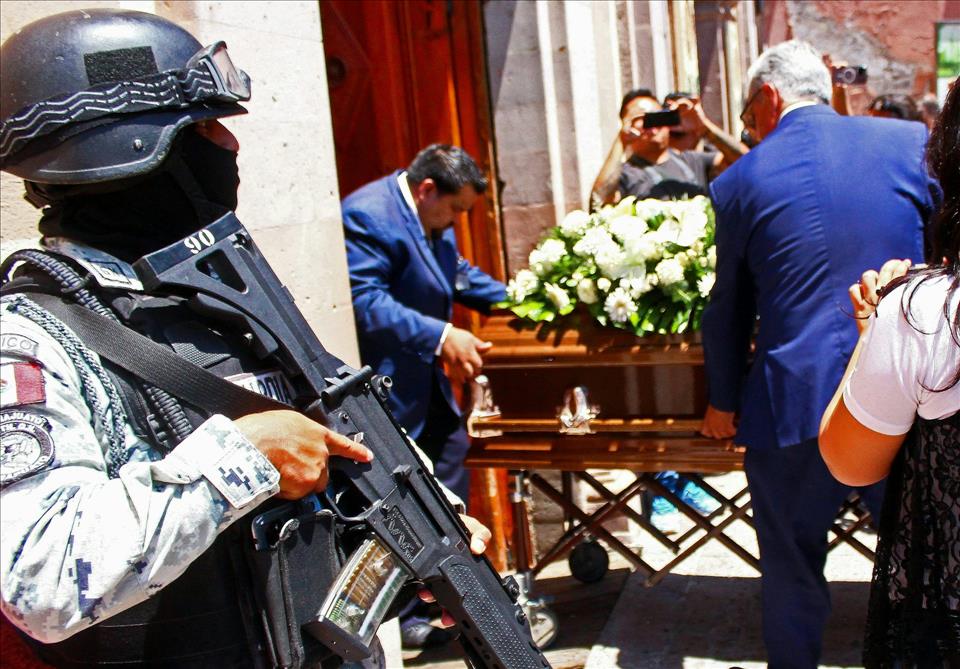
Mexico's Criminal Gangs Stir Up Political Violence Ahead Of Election Season
However, Mexico's election season is also one of political violence . Between 2018 and March 2024, there were 1,709 targeted attacks, murders, assassinations and threats against people working in politics or government, or against government and party facilities. Most of these attacks occurred in the run-up to an election; this year will be no different.
In fact, if the current statistics are anything to go by, Mexico's 2024 election season is likely to be the country's deadliest on record. In the first two months of the year, 33 people involved in politics were assassinated . And that figure is rising steadily as the elections approach.
Violence against Mexican politicians is common . But the country's powerful organised gangs step up political violence during election season as they look to ensure compliance from incoming candidates and secure business opportunities.
Mexico's most famous political assassination took place 30 years ago, in the build-up to the 1994 general election. Luis Donaldo Colosio, a charismatic presidential candidate who vowed to reform the country's historically autocratic political culture, was shot and killed during a campaign rally in the border city of Tijuana.
Luis Donaldo Colosio waving to reporters in Mexico City in 1993. Associated Press / Alamy Stock Photo
He was slain by Mario Aburto Martínez, an apparently non-political factory worker. But critics have long rejected the official finding that Aburto acted alone. They argue that drug cartel leaders and those with vested political interests were behind the assassination because they worried about a prospective crackdown on their activities.
Colosio's reformist agenda advocated for a more leftward turn, away from pro-market privatisation policies. This undermined both the criminal fraternity and the established political order.
It's not just high-ranking politicians that are at risk. Mexican politicians at all levels are repeatedly targeted by violence linked to organised crime, especially those who hold or seek regional positions. On April 20 2024, for example, two mayoral candidates were killed in separate attacks in different parts of the country.
One of them, Alberto Garcia, was running for mayor of San Jose Independencia in the southern state of Oaxaca. The victims of such violence are distributed throughout all political positions and parties. But the gangs most often target the candidate challenging the incumbent, fearing a change in the status quo.
Gangs have much to loseElections offer good business opportunities for Mexico's criminal organisations. In the past, their economic interests were strictly confined to the production and retailing of narcotics. However, in recent years, they have diversified their economic interests and are now looking to exploit new opportunities.
In Mexico, municipal authorities enjoy considerable economic power. They receive state and federal funding to undertake infrastructural projects in their areas, such as building roads, schools and hospitals. The gangs have begun to demand they be the purveyors of these projects, which can be mismanaged and the allocated funds siphoned off.
Studies have shown that drug cartels exert their will not only through political assassinations, but also by putting up their own candidates or financing the campaigns of candidates who will allow them to operate. If there is any opposition from rival candidates, it often leads to an open bloodbath .
This sentiment was acknowledged in early April by Mexico's outgoing president, Andrés Manuel López Obrador. He said :“They [the cartels and criminal gangs] make an agreement and say, 'this person is going to be mayor; we don't want anyone else to register to run', and anybody who does, well, they know [what to expect]”.
Another factor behind the accelerating political violence in Mexico is the fragmentation of the country's criminal organisations. Previously, there was a clear vertical organisation of cartel hierarchy. This ensured that one particular cartel could put up its candidate for a specific political post with little meaningful opposition.
Mexican federal police forces maintaining order in the violent border city of Ciudad Juárez. Frontpage/Shutterstock
However, Mexico's main cartels have split into separate branches. As they have done so, they have come to meet greater competition and the fielding of candidates from opposite sides. This has led to more direct violence against political candidates contesting for the same post.
Simply put, the ongoing violence against politicians and political candidates in Mexico reflects the struggle for territorial consolidation and lucrative business opportunities among various organised criminal gangs.
Fears of earning the wrath of the criminal gangs often prevents well-intentioned politicians from running for public office. In some of the country's most rural reaches, where organised criminal gangs are at their most powerful, the cartel's preferred picks have in the past won races unopposed . And the wave of violence ahead of the 2024 elections has already forced dozens of candidates across multiple states to back out of their races fearing for their lives.
In a region of the world that is marred by coups, counter-coups and dictatorships, Mexico was always a shining example of a nation adhering to strict democratic credentials. That record now risks being tarnished by the violent intervention of criminal gangs in the country's political processes.

Legal Disclaimer:
MENAFN provides the
information “as is” without warranty of any kind. We do not accept
any responsibility or liability for the accuracy, content, images,
videos, licenses, completeness, legality, or reliability of the information
contained in this article. If you have any complaints or copyright
issues related to this article, kindly contact the provider above.


















Comments
No comment